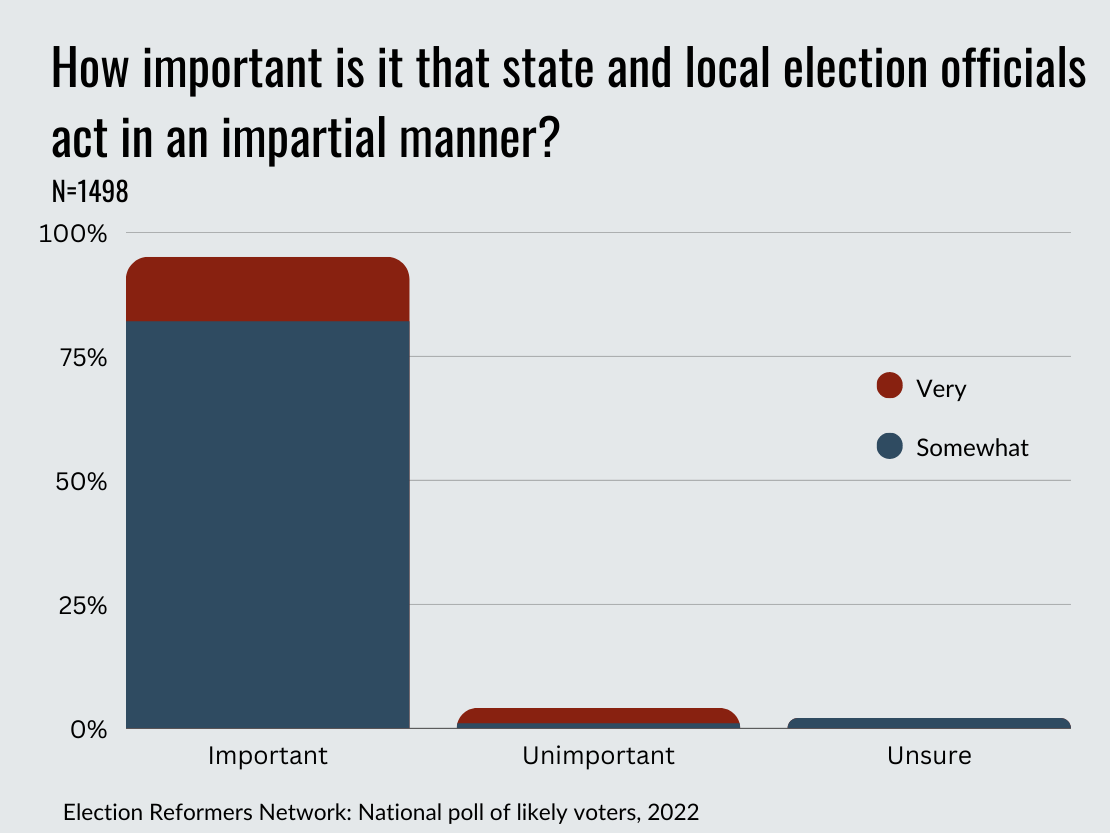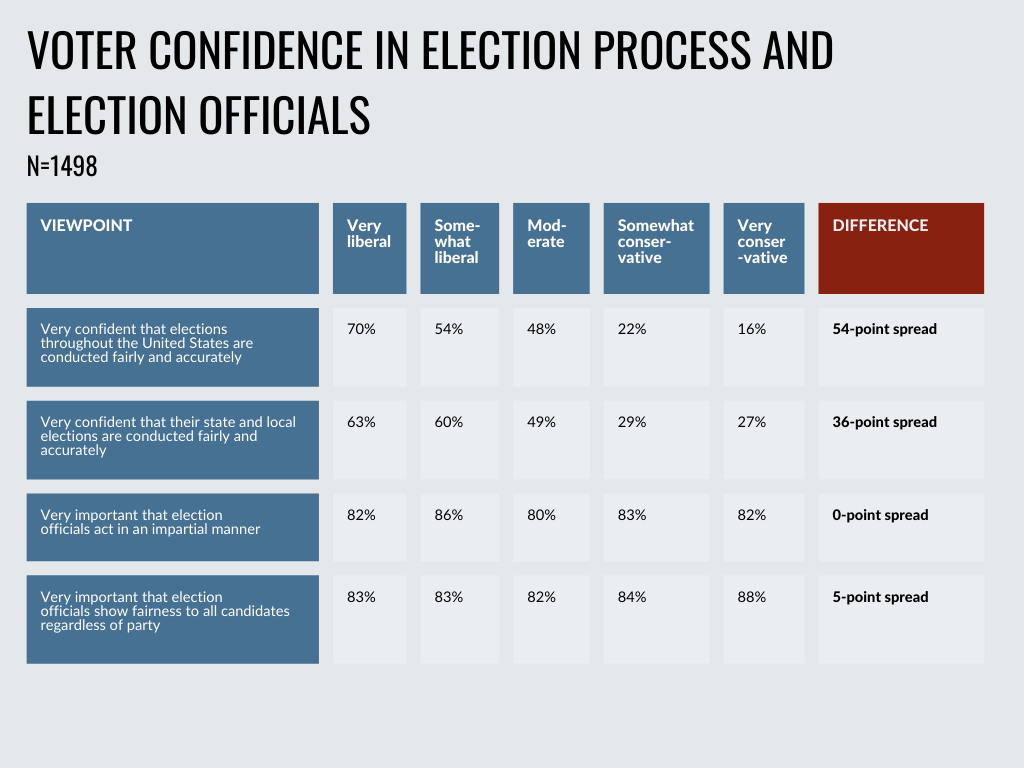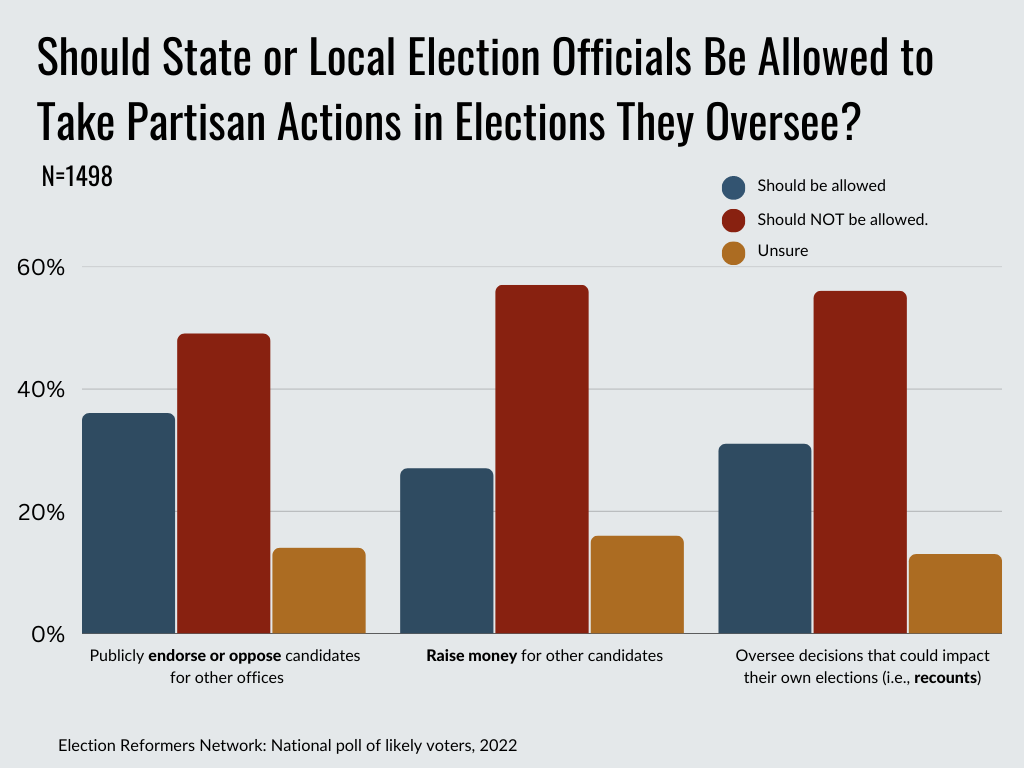National Poll on Election Administration
Numerous surveys in the last two years have found worryingly low levels of trust in U.S. elections. A new national poll of 1,498 likely voters, commissioned by Election Reformers Network, goes further, asking for views on our system of election administration and on changes aimed at bolstering voter trust.
The findings suggest that voters:
- Place significant value on having election officials acting impartially
- Aren’t satisfied with the level of impartiality that currently exists
- Want elections officials to meet minimum qualifications before taking office
- Want rules limiting partisan activities by election officials
Findings
Voters differ on ideological lines over whether elections are run fairly. But they strongly agree that election officials should act impartially.
Seventy percent of very liberal respondents said they were very confident that elections throughout the U.S. are conducted fairly and accurately. Just 16% of very conservative respondents said the same — a major split that likely reflects diverging views on the 2020 election.

But when respondents were asked how they want election officials to act, there was overwhelming agreement. A vast majority (82%) of all respondents said it’s very important that election officials act in an impartial manner (see chart below). The level of agreement tracked across parties: 84% of Democrats, 78% of Republicans, and 86% of independents answered “very important” to this question.
And, responding to a different question, 81% of Democrats, 85% of Republicans, and 87% of independents said it’s very important that candidates for election official positions are committed to fairness for all candidates, regardless of party.
These findings may seem unsurprising — of course the umpire shouldn’t play for one team. But much of the U.S. system of election administration is based on the hope that officials selected in partisan processes with close ties to one party will act impartially. That hope is becoming increasingly difficult to sustain, and voters of all political persuasions appear to overwhelmingly favor a straightforward impartial model — the approach used by almost all our peer democracies.
Voters differ along ideological lines in their confidence in elections, but firmly agree on the importance of impartiality by election officials.
Despite this widespread agreement that election officials must behave with impartiality, few states have laws to ensure this standard is met.

Partisan election administration is distrusted by voters across the spectrum.
All 50 states rely on partisan processes to select the people or boards in charge of directing elections at the state level, and roughly 60% of local election officials are elected or appointed in a partisan manner. But over two-thirds of respondents (including 66% of Democrats, 69% of Republicans, and 70% of independents) said it’s difficult to trust the impartiality of election officials who are elected with the support of a political party. When asked if they believed their own state election officials would settle an election dispute fairly, only around half (55%) said yes. Over a quarter (28%) reported they were unsure, and 18% said they did not believe the dispute would be settled fairly.
Taken together, these results suggest that voters’ desire for elections to be run impartially isn’t being fulfilled, and that the partisan elements of our system of election administration are contributing to voters’ lack of confidence in elections.
More voters than not think election officials should be prohibited from acting like partisans.
A plurality of voters opposes election officials being allowed to act like regular candidates, including taking steps such as endorsing or fundraising for other candidates. (Generally speaking, the U.S. is far out of step with other modern democracies in allowing such activities.)
For two of these activities, clear majorities said election officials should be barred from doing them. For the third (publicly endorsing or opposing candidates for other offices), a plurality said they should be barred. ERN’s model ethics legislation would prohibit election officials from taking all of these steps.

Voters want election officials to be qualified for the job.
Seventy-one percent of respondents (including 77% of Democrats, 67% of Republicans, and 66% of independents) said they agree that candidates for election official positions should be required to have some experience running elections. Just 8% disagree, while 16% have no opinion.
Again, no state has such requirements. Separate ERN model qualifications legislation would require that candidates for top state election posts meet minimum qualifications to run elections. If this legislation had been in effect nationwide this year, nearly all of the candidates for secretary of state who have refused to accept the 2020 presidential results would have been disqualified.

No major differences between partisans on voter fraud and voter suppression.
The share of Republicans who said it’s important that election officials be committed to stopping voter fraud (96%) was barely larger than the share of Democrats (94%) who said this. Similarly, 95% of Democrats and 93% of Republicans said it’s very important that election officials combat voter suppression.
This finding suggests that, despite the heated partisan rhetoric around voting and elections, what voters of all stripes overwhelmingly want election officials to do is relatively simple: provide fair, secure, and accessible elections.
ABOUT ERN
Election Reformers Network (ERN) is a nonpartisan, nonprofit public policy organization founded in 2017 by election experts with extensive experience in the United States and overseas. ERN creates and advances reforms that reduce polarization and secure elections against partisan manipulation.
METHOD
This national survey was conducted on behalf of ERN by the independent firm, Research & Polling, Inc. A total of 1,498 online surveys were completed among Dynata panel members nationwide who confirmed they are registered to vote and very likely to vote in the 2022 General Election. Surveys were conducted between August 6th and August 15th, 2022.
To help ensure a representative sample, a proportional share of surveys was completed across four geographic regions based on U.S. Census population data.
Furthermore, to reduce the potential for sampling bias, Research & Polling, Inc. weighted the surveys for various demographic segments of the population in order to reflect a representative distribution of the likely voter population.
LEARN MORE
Press contact:
ERN Communications
press@electionreformers.org
Research contact:
Heather Balas, ERN Vice President of Programs

